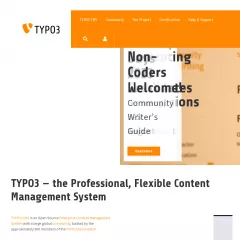
TYPO3 is an open-source content management system (CMS) that allows users to create and manage websites and digital content. It is known for its flexibility, scalability, and enterprise-level capabilities. Here are some key aspects of TYPO3:
Content Management: TYPO3 provides a robust and intuitive content management interface that allows users to create, edit, and organize website content. It supports a wide range of content types, including text, images, videos, files, and more. Content can be structured into pages and organized hierarchically.
Customization and Flexibility: TYPO3 offers extensive customization options, allowing users to tailor their websites to specific requirements. It provides a flexible templating system that enables the creation of unique designs and layouts. Users can also extend TYPO3's functionality by adding custom extensions or integrating third-party plugins.
Multilingual and Multisite Support: TYPO3 has built-in support for managing multilingual websites and handling multiple sites within a single TYPO3 installation. It enables users to create and manage content in multiple languages, facilitating localization and internationalization efforts. Multiple websites or domains can be managed from a single TYPO3 instance.
Scalability and Enterprise-Level Features: TYPO3 is designed to handle large and complex websites and can scale to meet the needs of enterprise-level projects. It provides features like multi-site management, advanced user and group permissions, versioning and workflow management, content staging and publishing, and more. These features make TYPO3 suitable for organizations with complex content management requirements.
Extensive Extension Marketplace: TYPO3 has a vibrant community of developers who contribute a wide range of extensions to enhance TYPO3's functionality. The TYPO3 Extension Repository (TER) offers numerous extensions for adding features like e-commerce, SEO optimization, form builders, social media integration, and more. Users can leverage these extensions to extend the capabilities of their TYPO3 websites.
SEO-Friendly: TYPO3 provides built-in features and best practices to support search engine optimization (SEO). It allows users to define metadata, URL structures, and implement SEO techniques to improve the visibility and ranking of their websites in search engines.
Community and Support: TYPO3 has an active and supportive community of developers, contributors, and users. Users can access documentation, forums, user groups, and events to get help, share knowledge, and stay updated with the latest developments in the TYPO3 ecosystem. Professional support and consulting services are also available for those seeking dedicated assistance.
TYPO3 is suitable for a wide range of websites, from small business websites to large enterprise portals. Its robust features, customization options, and scalability make it a popular choice for organizations that require a powerful and flexible content management system.
Content Management: TYPO3 provides a robust and intuitive content management interface that allows users to create, edit, and organize website content. It supports a wide range of content types, including text, images, videos, files, and more. Content can be structured into pages and organized hierarchically.
Customization and Flexibility: TYPO3 offers extensive customization options, allowing users to tailor their websites to specific requirements. It provides a flexible templating system that enables the creation of unique designs and layouts. Users can also extend TYPO3's functionality by adding custom extensions or integrating third-party plugins.
Multilingual and Multisite Support: TYPO3 has built-in support for managing multilingual websites and handling multiple sites within a single TYPO3 installation. It enables users to create and manage content in multiple languages, facilitating localization and internationalization efforts. Multiple websites or domains can be managed from a single TYPO3 instance.
Scalability and Enterprise-Level Features: TYPO3 is designed to handle large and complex websites and can scale to meet the needs of enterprise-level projects. It provides features like multi-site management, advanced user and group permissions, versioning and workflow management, content staging and publishing, and more. These features make TYPO3 suitable for organizations with complex content management requirements.
Extensive Extension Marketplace: TYPO3 has a vibrant community of developers who contribute a wide range of extensions to enhance TYPO3's functionality. The TYPO3 Extension Repository (TER) offers numerous extensions for adding features like e-commerce, SEO optimization, form builders, social media integration, and more. Users can leverage these extensions to extend the capabilities of their TYPO3 websites.
SEO-Friendly: TYPO3 provides built-in features and best practices to support search engine optimization (SEO). It allows users to define metadata, URL structures, and implement SEO techniques to improve the visibility and ranking of their websites in search engines.
Community and Support: TYPO3 has an active and supportive community of developers, contributors, and users. Users can access documentation, forums, user groups, and events to get help, share knowledge, and stay updated with the latest developments in the TYPO3 ecosystem. Professional support and consulting services are also available for those seeking dedicated assistance.
TYPO3 is suitable for a wide range of websites, from small business websites to large enterprise portals. Its robust features, customization options, and scalability make it a popular choice for organizations that require a powerful and flexible content management system.